|
De Nederlandse schrijver Jamal Ouariachi werd geboren in Amsterdam op 8 december 1978. Zie ook alle tags voor Jamal Ouariachi op dit blog.
Uit: De Vernietiging van Prosper Morèl
“Geen antwoord.
‘De gaten in de kaas, mevrouw! Greppels waar onsmakelijk groen water doorheen stroomt! Is dat het gezicht van Amsterdam? Een klysma dat de aars van de stad reinigt? Ik mag toch hopen van niet!’
Gespeelde verontwaardiging in zijn wijd opengesperde ogen. Wij lachten gul, ’t was een artiest, die gids, een echte showman, en zo deskundig ook op z’n vakgebied.
‘Bovendien zijn grachten niet uniek voor Amsterdam; Utrecht heeft ze ook. En wat dacht u van Venetië? Juist... I rest my case.’
De dame lachte beschaamd haar vernedering weg, de gids maakte een verzoenend geeftniksgebaar en hervatte zijn verhaal op een serieuzere toon.
‘Laat ik zelf eens wat kandidaatsymbolen noemen. De grachtenpánden misschien, met hun pittoreske gevels? Zeker een belangrijk kenmerk van de oude binnenstad, maar het probleem is: er zijn er te veel van! Er bestaat niet zoiets als één archetypische gevel, die ene gevel waar iedereen meteen aan denkt als je “Amsterdam” zegt... Conclusie: ook de grachtenpanden voldoen niet.’
Wij voelden vaaglijk aan waar de gids heen wilde met zijn verhaal:de kolossale, bijna angstaanjagende toren, daar achter hem, viel niet te negeren. Maar zover was hij nog niet, de gids, hij was een man die zijn eigen woordegraag hoorde en er daarom de tijd voor nam, hij had geen haast, dat gebouw bleef wel staan.
‘Wat hebben we nog meer? Het Rijksmuseum? De Westerkerktoren? Het Paleis op de Dam? U gaat die prachtwerken de komende dagen allemaal zien, dames en heren, maar er zit geen icoon tussen die alle andere overbodig maakt. Kunt u nagaan, ik leid deze stadswandelingen al jaren, en al die tijd ben ik op zoek geweest naar een samenvatting, naar één woord om de stad te kenschetsen. Tevergeefs, zo leek het.”
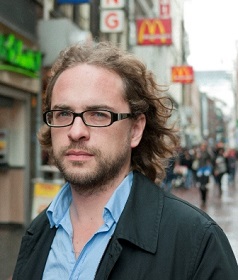
Jamal Ouariachi (Amsterdam, 8 december 1978)
De Britse schrijver Louis de Bernières werd geboren in Londen op 8 december 1954. Zie ook alle tags voor Louis de Bernières op dit blog.
When the time comes
When the time comes, it is better that death be welcome,
As an old friend who embraces and forgives.
Sieze advantage of what little time is left,
And if imagination serves, if strength endures, if memory lives,
Ponder on those vanished loves, those jesting faces.
Take once more their hands and press them to your cheek,
Think of you and them as young again, as running in the fields,
As drinking wine and laughing.
And if you wish, let there be Spanish music, Greek seas
And French sun, the hills of Ireland if you loved them,
Some other place if that should please, some other music
More suited to your taste.
Consider, if you can, that
Soon you’ll shed this weariness, this pain,
The heaped-upon indignities, and afterwards - who knows?
Perhaps you’ll walk with angels, should angels be,
By fresher meadows, unfamiliar streams.
You may find that those who did not love you do so now,
That those who loved you did so more than you believed.
You may go on to better lives and other worlds.
You may meet God, directly or disguised.
You may, on the other hand - who knows? - just wander off
To sleep that seamless, darkest, dreamless, unimaginable sleep.
Do not be bitter, no world lasts forever.
You who travelled like Odysseus,
This is Ithaca, this your destination,
This your last adventure. Here is my hand,
The living to the dying;
Yours will grow cold in mine, when the time comes.
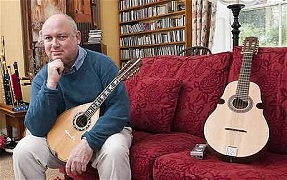
Louis de Bernières (Londen, 8 december 1954)
De Amerikaanse schrijfster Mary Catherine Gordon werd geboren op 8 december 1949 in Far Rockaway, New York. Zie ook alle tags voor Mary Gordon op dit blog.
Uit:Circling My Mother
“My mother was once a beautiful woman, but all her teeth are gone now. Toothless, no woman can be considered beautiful. Whenever I arrive, she is sitting at the table in the common dining room, her head in her hands, rocking. Medication has eased her anxiety, but nothing moves her from her stupor except occasional moments of fear, too deep for medication. This is a room that has no windows, that lets in no light, in which an overlarge TV is constantly blaring, sending images that no one looks at, where the floors are beige tiles, the walls cream-colored at the bottom, papered halfway up with a pattern of nearly invisible grayish leaves. Many of the residents sit staring, slack-jawed, open-mouthed. I find it impossible to imagine what they might be looking at.
It is difficult to meet the eyes of these people; it is difficult to look at their faces. I wonder if Bonnard could do anything with this lightless room. If he could enter it, see in these suffering people, including my mother, especially my mother, only a series of shapes and forms, concentrate on the colors of their clothing (a red sweater here, a blue shirt there), transform the blaring images on the TV screen to a series of vivid rectangles, and, failing to differentiate, insisting on the falseness of distinctions, of an overly rigid individuality, saying that we must get over the idea that the features of the face are the important part-would he be able to create a scene of beauty from this scene, which is, to me, nearly unbearable? He once told friends that he had spent much of his life trying to understand the secret of white. How I envy him such a pure preoccupation, so removed from the inevitable degradations of human character and fate. So he could paint wilting flowers, overripe fruit, and make of them a richer kind of beauty, like the nearly deliquescing purple grapes, the visibly softening bananas of Bowl of Fruit, 1933. "He let the flowers wilt and then he started painting; he said that way they would have more presence," his housekeeper once said."
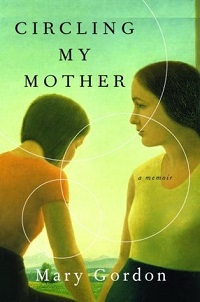
Mary Gordon (Far Rockaway, 8 december 1949)
Cover
De Amerikaanse schrijver Bill Bryson werd geboren in Des Moines (Iowa) op 8 december 1951. Zie ook alle tags voor Bill Bryson op dit blog.
Uit:The Road to Little Dribbling
“I had never really stopped to consider what an extraordinary thing the Royal National Lifeboat Institution is. Think about it. A troubled ship calls for help, and eight people – teachers, plumbers, the guy who runs the pub – drop everything and put to sea, whatever the weather, asking no questions, imperilling their own lives, to try to help strangers. Is there anything more brave and noble than that?”
(..)
“Formerly there were two ways. One was to take the ferry. This is the way I came on my first visit, and I have to say it was strange. All the passengers – and there weren’t many – went below and lay down on whatever horizontal surface they could find. Many covered their faces with their coats, as if hiding. Just after we left port, the snack bar closed. All this seemed a little odd, and then we hit the open sea and we began to roll and pitch in a weirdly restrained way. I am not the most experienced of sailors, but I have been on a few boats in my time – including once through the Beagle Channel in South America, which isn’t so much a water passage as a trampoline for boats – and I can say that I had never encountered anything quite like this. It wasn’t rough, but just slowly, cumulatively, peculiarly unsettling. The problem, as it was explained to me later, is that the ferry must have a flat bottom to get in among the shallows around St Mary’s, the main port of the Scillies, but this means that it sits on the water like a cork, which guarantees a lot of motion even on the smoothest days. In rough weather, I was told, you will often have the novel experience of being sick on the ceiling.”
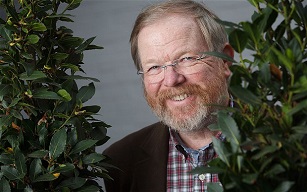
Bill Bryson (Des Moines, 8 december 1951)
De Amerikaanse dichter en schrijver Delmore Schwartz werd geboren op 8 december 1913 in New York. Zie ook alle tags voor Delmore Schwarz op dit blog.
Calmly We Walk Through This April's Day
Calmly we walk through this April's day,
Metropolitan poetry here and there,
In the park sit pauper and rentier,
The screaming children, the motor-car
Fugitive about us, running away,
Between the worker and the millionaire
Number provides all distances,
It is Nineteen Thirty-Seven now,
Many great dears are taken away,
What will become of you and me
(This is the school in which we learn...)
Besides the photo and the memory?
(...that time is the fire in which we burn.)
(This is the school in which we learn...)
What is the self amid this blaze?
What am I now that I was then
Which I shall suffer and act again,
The theodicy I wrote in my high school days
Restored all life from infancy,
The children shouting are bright as they run
(This is the school in which they learn . . .)
Ravished entirely in their passing play!
(...that time is the fire in which they burn.)
Avid its rush, that reeling blaze!
Where is my father and Eleanor?
Not where are they now, dead seven years,
But what they were then?
No more? No more?
From Nineteen-Fourteen to the present day,
Bert Spira and Rhoda consume, consume
Not where they are now (where are they now?)
But what they were then, both beautiful;
Each minute bursts in the burning room,
The great globe reels in the solar fire,
Spinning the trivial and unique away.
(How all things flash! How all things flare!)
What am I now that I was then?
May memory restore again and again
The smallest color of the smallest day:
Time is the school in which we learn,
Time is the fire in which we burn.
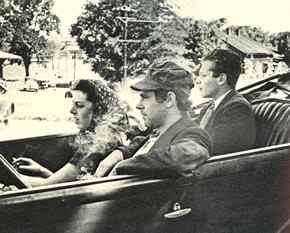
Delmore Schwartz (8 december 1913 – 11 juli 1966)
Hier in de auto achter Alma en James Agee in 1939
De Amerikaanse zanger, dichter en tekstschrijver James Douglas (Jim) Morrison werd geboren in Melbourne (Florida) op 8 december 1943.Zie ook alle tags voor Jim Morrison op dit blog.
What are you doing here?
What are you doing here?
What do you want?
Is it music?
We can play music.
But you want more.
You want something & someone new.
Am I right?
Of course I am.
You want ecstasy
Desire & dreams.
Things not exactly what they seem.
I lead you this way, he pulls that way.
I'm not singing to an imaginary girl.
I'm talking to you, my self.
Let's recreate the world.
The palace of conception is burning.
Look. See it burn.
Bask in the warm hot coals.
You're too young to be old
You don't need to be told
You want to see things as they are.
You know exactly what I do
Everything
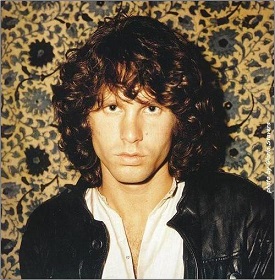
Jim Morrison (8 december 1943 – 3 juli 1971)
De Franse theaterauteur Georges Feydeau werd geboren op 8 december 1862 in Parijs. Zie ook alle tags voor George Feydeau op dit blog.
Uit: Le dindon
« « PONTAGNAC. – Eh bien ! en voilà une surprise !...
VATELIN. – Comment « en voilà une surprise ! » puisque vous êtes chez moi, vous deviez bien vous attendre à m’y trouver.
PONTAGNAC. – Hein ?... non... je veux dire : en voilà une surprise que je vous fais, hein ?
VATELIN. – Ah ça ! oui, par exemple !
LUCIENNE. – Ah bien ! elle est forte ! (À Vatelin.) Comment, tu connais monsieur ?
VATELIN. – Si je le connais !
PONTAGNAC , affolé. – Oui... oui, il me... (Perdant la tête, prenant un louis de sa poche et le mettant dans la main de Lucienne.) Tenez, prenez ça ! pas un mot ! pas un mot !
LUCIENNE, ahurie. – Hein ! il me donne un louis !
VATELIN, qui n’a pas vu le jeu de scène. – Eh bien ! qu’est-ce que vous avez ?
PONTAGNAC. – Moi, je n’ai rien ! Qu’est-ce que vous voulez que j’aie ?
Vatelin remonte un peu.
LUCIENNE, bas.– Mais, monsieur, reprenez ça ! Qu’est-ce que vous voulez que je fasse de ce louis ?
PONTAGNAC.– Oh ! pardon, madame ! (À part.) Je ne sais plus ce que je fais ! Je perds la tête !
VATELIN. – Ah ! ce brave ami ! Vrai, vous ne sauriez croire combien je suis sensible ! Moi qui avais renoncé à l’espoir de vous recevoir jamais chez moi, vous qui m’aviez promis si souvent... »
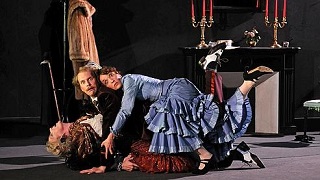
Georges Feydeau (8 december 1862 - 5 juni 1921)
Scene uit een opvoering in Parijs, 2010
Zie voor nog meer schrijvers van de 8e december ook mijn blog van 8 december 2014 en ook mijn blog van 8 december 2013 deel 1 en ook deel 2.
|



